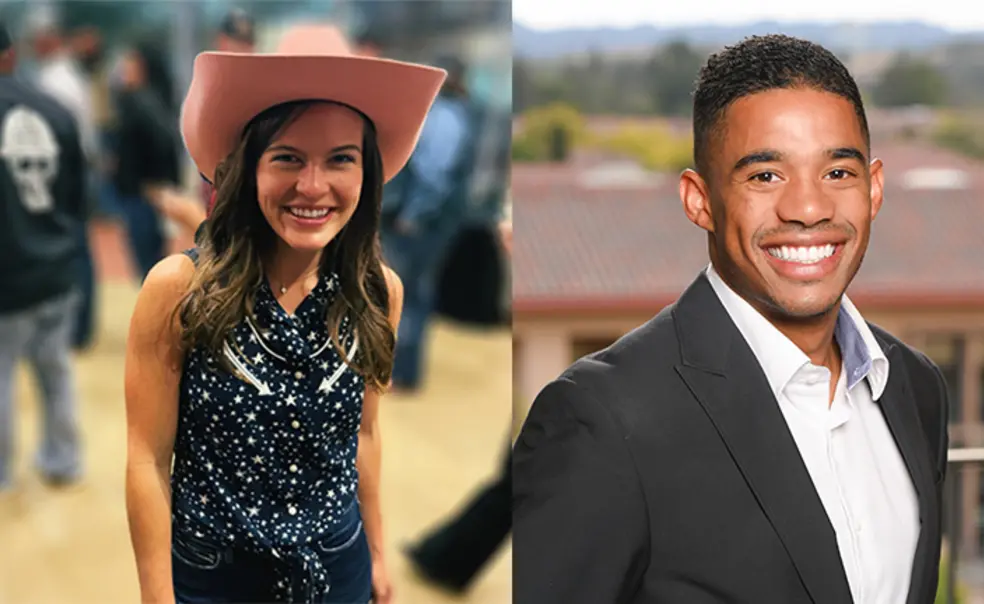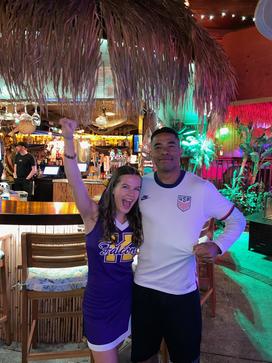Lizzy McGee ’18 and Gaby Joseph ’18 Have a Dream the Size of Texas
The two Princetonians are hatching plans to build a theme park
Texans love Texas. This couldn’t be more true than for Lizzy McGee ’18 and her family. McGee is a sixth-generation Texan and Houstonian, and Texas pride runs through her veins. Her 90-year-old grandmother exclusively watches the Longhorn Network. When she was a kid, McGee’s late grandfather would quiz her on Astro lineups until he fell asleep.
“There’s one story that can bring my family together more than anything else and that’s the story of Texas,” McGee says.
Texas lore lives on in the state’s collective imagination. This, along with McGee’s affinity for theme parks, inspired her to draft the plans for her latest endeavor: a Texas-themed amusement park. She has fleshed out plans for Texasland in a Stanford Graduate School of Business class along with fellow Princeton alum Gaby Joseph ’18. The two Princetonians and their other team members have launched a Kickstarter campaign to raise funds for a professional demand study, an initial step in bringing this dream to fruition.
McGee was sitting in a hot tub overlooking Lake Travis near Austin when the idea dawned on her, she says. The pandemic had brought her home, and she chatted with her siblings about her belief that Texas, and the Houston area specifically, needs a theme park.
McGee knows about theme parks. A history major at Princeton, she went on to work in strategy at Disney, doing internal consulting for the theme parks, cruises, hotels, and merchandise. She also worked for Madrid-based Parques Reunidos, which runs theme parks, zoos, and aquariums around the world.
Astroworld, a Six Flags site in Houston, closed in 2005, leaving the fourth largest city in the U.S. without a theme park. It can be wallet-breaking for many Texas families to travel all the way to Disneyland in California. In McGee’s mind, Texas’ substantial population, unique sense of identity, and sheer space make it an ideal candidate for a theme park.
McGee started brainstorming themes and the kind of intellectual property, or IP, they could feasibly obtain, and then it hit her. “Texas is our celebrity,” McGee recalls thinking. “You don’t even need IP, you just need Texas.”
Attractions currently on the Texasland map — though this is open to change — include Apollo 11 Mission Control, based on NASA’s historic lunar mission launched from Houston, and Bowie’s Lost Silver Mine, inspired by the fabled site of Texan Jim Bowie’s failed expedition.
McGee brought the idea with her to Stanford Graduate School of Business, where Joseph was one of her first friends. There she applied for a class called Startup Garage, which guides students through exploring and developing new business models. She called on Joseph to join her team, and he enthusiastically agreed.
The two other team members are also theme park enthusiasts, so Joseph has brought in a much-needed outside perspective. “We sometimes have the curse of knowledge working against us,” McGee says. “So, Gaby’s been helpful with pressure-testing the concept.”
The Kickstarter campaign is in full swing and ends on April 30. As of April 19 it had raised $71,108 toward the $71,212 goal, from 199 donors. Kickstarter named Texasland a “Project We Love,” a designation that only 7% of campaigns receive. The next step is getting support from investors, and if all goes according to plan, a preliminary operating plan has the park opening in the second half of 2026.
In January, Universal Studios announced plans to build a theme park in Frisco, Texas, validating McGee’s hypothesis that the demand for amusement parks in Texas is high, she says.
“This is what keeps me up late at night and working early in the morning,” McGee says. “It’s something that generations of families can do together and that’s accessible.”











No responses yet